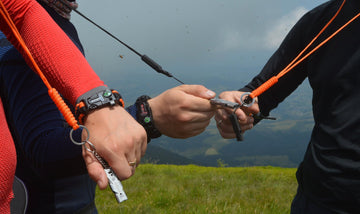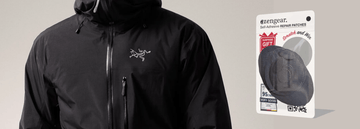Why a Loud Whistle is an Essential Outdoor Tool: Safety, Communication, and Survival
by Emily Jannet on Sep 18, 2023
In the realm of outdoor adventures, whether you're hiking, camping, or simply exploring the wilderness, having the right tools can be the difference between an unforgettable experience and a potentially hazardous situation. Amid the multitude of gear available to outdoor enthusiasts, a loud whistle may not be the first thing that comes to mind, but it should unquestionably be a fundamental item on your checklist. In this comprehensive article, we will delve into the reasons why a loud whistle is an indispensable outdoor tool, exploring its pivotal roles in safety, communication, and survival scenarios.
Safety First: The Power of Sound
Alerting Others to Your Presence
The primary function of a loud whistle in outdoor environments is to draw attention to your location in case you find yourself in a perilous situation. Whether you have strayed off the trail, encountered wildlife, or suffered an injury, the piercing sound of a loud whistle can be heard over substantial distances, rendering it highly effective for alerting fellow hikers or campers to your whereabouts.
Lost and Found: The wilderness can be disorienting. Thick foliage, rugged terrain, and rapidly changing weather conditions can easily lead even the most experienced adventurers astray. Should you venture off the beaten path or become disoriented, a loud whistle can serve as a guiding beacon for rescuers or fellow hikers, potentially reducing the time you spend lost and increasing the likelihood of a prompt and successful rescue.
Wildlife Encounters: While many wild animals are naturally more afraid of humans than we are of them, certain situations may necessitate a loud noise to discourage curious or aggressive wildlife. The high-pitched sound of a whistle can deter animals, providing you with critical seconds to react and protect yourself.
Emergency Situations: Injuries can occur unexpectedly, even to the most cautious adventurers. In the event of an accident or medical emergency, a whistle can serve as a lifeline, enabling you to signal for help when you might be unable to shout due to pain or exhaustion.
Signaling for Help
In dire circumstances, a whistle can function as a lifeline connecting you to potential rescuers. It is imperative to be familiar with the internationally recognized distress signal: three short blasts followed by a pause and then repeated. This pattern is widely understood by outdoor enthusiasts and emergency responders, signifying an immediate need for assistance.
Search and Rescue: When lost or injured in the wilderness, time is of the essence. Search and rescue teams often rely on audible signals like whistles to pinpoint the location of individuals in distress. The distinct and far-reaching sound of a loud whistle enhances the chances of a swift and successful rescue operation.
Staying Connected: Modern technology, including smartphones and GPS devices, has its limitations in remote areas. Batteries can deplete, signals can weaken, and devices can fail. In contrast, a whistle does not depend on batteries or network connectivity. It is a dependable tool that can maintain your connection to the outside world when other means falter.
Effective Communication: More Than Just Noise
Group Coordination
When you are part of a hiking or camping group, staying synchronized is vital for safety and enjoyment. A loud whistle can serve as an efficient means of communication, aiding you and your companions in staying connected, especially when you are spread out along a trail.
Signaling Milestones: Whistles can be used to signal significant waypoints or milestones along the trail, such as reaching a summit or a designated rest area. This ensures that everyone remains on the same page and reduces the risk of anyone getting lost.
Emergency Distress Calls: Accidents can occur within a group. In such instances, a whistle can be employed to swiftly summon help or alert others in your party to someone in distress. It provides a clear and unmistakable signal that something is amiss, allowing for an immediate response.
Weather Conditions
The outdoors are notorious for unpredictable weather conditions. When the elements take a turn for the worse, visibility can be significantly compromised. A loud whistle can be an invaluable tool for communication during these challenging moments.
Fog and Rain: In dense fog or heavy rain, it is easy to lose sight of your fellow adventurers, even when they are in close proximity. The sound of a whistle pierces through the elements, enabling you to stay connected and prevent anyone from becoming separated from the group.
Snow and Avalanche Safety: Winter adventurers, such as skiers and snowshoers, often face the risk of avalanches. In such situations, a whistle can be utilized to signal for help if someone becomes buried in the snow, increasing their chances of being rescued before it is too late.
Survival: More Than a Whistle Stop
Fire Starting
Survival in the wilderness often hinges on your ability to secure food, water, and shelter. Fire is one of the most critical elements in this equation, providing warmth, protection, and a means of cooking. Surprisingly, your whistle can be an asset in starting a fire.
Using Your Whistle as a Fire Starter: Many modern whistles are crafted from plastic or metal, both of which can generate sparks. By striking the metal portion of your whistle against a hard surface, such as a rock or knife blade, you can create sparks that can ignite dry tinder, giving you the essential spark to start a fire.
Hunting and Signaling
In a survival scenario, you might need to signal for help or procure food. Your whistle can serve both of these purposes.
Animal Calls: Whistles can mimic the sounds of animals, which can be useful for attracting potential game for hunting or scavenging.
Signaling for Rescue: If you find yourself stranded and in need of rescue, a whistle can help you attract attention over long distances. The loud, high-pitched sound is distinctive and unnatural in the wilderness, making it more likely to be noticed by passing hikers or search and rescue teams.
Conclusion
In the realm of outdoor adventures, where challenges and unexpected situations are par for the course, it is imperative to be well-equipped with the right tools. A loud whistle is an often underestimated yet essential outdoor tool that can play a pivotal role in your safety, communication, and survival.
Whether you are hiking, camping, skiing, or engaging in any other outdoor pursuit, a loud whistle can help you stay connected with your group, signal for help in emergencies, and even assist with fire starting and hunting in survival situations. Before embarking on your next adventure, make sure to include a reliable, loud whistle in your gear—an unassuming tool that can make a profound difference when it matters most in the great outdoors.





